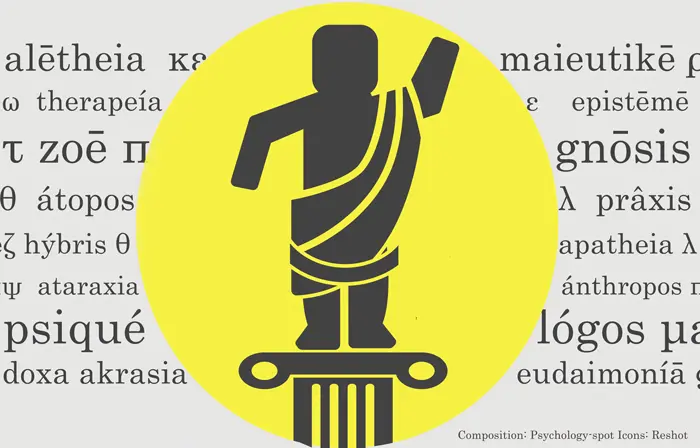
Sometimes I get the impression that I’m living in a lousy Hollywood action movie in which terrific heroes face terrifying villains, as if life itself were a parody of those caricatured characters and not the other way around. In recent times, that feeling has become more acute as a result of the increasingly simplistic and extreme attitudes that abound everywhere.
There is always someone willing to evangelize with absolute truths. Someone willing to unhesitatingly draw the line between good and bad, right and wrong – conveniently siding with the “right” side to put dissent on the “wrong” side. There is always someone who reduces the colors of the world to a simplistic scale of black and white where doubt or reflection have no place. Someone, in short, willing to give the coup de grace to the sensible balance that is born from the complexity of life.
Ancient wisdom to the rescue of moderation and balance
The ancient philosophers had a more balanced worldview. In ancient Greece, moderation was a highly valued value. It is no coincidence that two phrases were inscribed in the Temple of Apollo at Delphi, one of which passed to posterity while the other was conveniently forgotten. “Gnóthi seautón”, which means “know yourself” and “Medèn ágan”, which means “nothing in excess”. The latter points to the moderation of the senses, actions and words.
Aristotle often spoke to his disciples of the “mesòtes“ or right middle ground. For this philosopher, nothing was good or bad in an absolute sense, but it depended on the dose. For example, having too little courage leads to a faint-hearted personality, but too much courage leads to recklessness. “Virtue is an intermediate position between two vices, one by excess and the other by default,” he said.
For those philosophers, practicing moderation and balance was an essential condition for living more satisfactorily and happily. It is also true for Buddhist philosophy, a vision of the world and of humanity in which nothing is good or bad, simply because both concepts are nothing more than the obverse and reverse of the same coin.
On the other hand, modern society, with its incessant stream of stimuli, pushes us to oscillate between the extremes, sinning by default or excess, because everything is configured in opposite terms. Everything is set up in terms of good or bad. We have heroes and villains. And everything pushes us to choose between these two sides. However, such a limited factory configuration prevents us from realizing the wonderful richness that exists between those extremes.
The high cost we pay moving away from the middle ground
Extremes must exist. Of course. In fact, they are very important because their very existence makes it possible to define the middle ground, the balance. The extremes mark the limits, also indicating the path towards moderation.
However, when there is too much polarization, the middle term is reduced and the extremes are exaggerated. Thus we end up more and more trapped in our own bubbles, although perhaps it would be more correct to say “impregnable bunkers” where dissident perspectives are prohibited from entering.
In recent times, that polarization has become so extreme that it seems to have divided the world into black and white, left and right, for and against… And between each position there is a huge gulf full of contempt and disrespect.
When nothing is understood other than a position sheltering behind motivated ignorance, fertile ground for confrontation is created. Nowhere is that chasm more visible than on social media, where there always seem to be people ready with tomahawks in hand to defend their digital trenches.
That narrow-mindedness ends up being fertile ground for alienation, bitterness, recrimination and hatred because when we believe without discussing it the narrative of the “good” and the “bad”, we lose the ability to dialogue. The ability to reflect is lost. Even individuality is lost.
Fortunately, there are many antidotes to such extremism. The open mind. The willingness to dialogue. The acceptance of human complexity. The empathic effort… Without these tools we are condemned to replicate increasingly simplistic visions of what is happening, assuming increasingly extreme positions that, far from freeing us, will make us more slaves to a biased and myopic narrative.




Leave a Reply